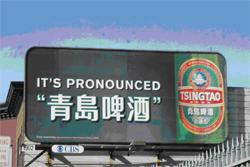Anheuser-Busch InBev to sell minority stake in Tsingtao to Asahi
The deal marks the start of a fire sale by InBev to pay for last year’s cash-based USD 52 billion acquisition of U.S. icon Anheuser-Busch. Due to the financial crisis, InBev had trouble putting together the USD 45 billion loan package. AB-InBev now has USD 14 billion in debt to pay off by late next year.
It looks like Anheuser-Busch’s stake in Tsingtao is the first of four assets to be disposed of. The others are Anheuser-Busch’s theme parks, SeaWorld and Busch Gardens, and InBev’s breweries in Korea and Germany, including the one that makes the popular brand Beck’s.
However, the credit crunch is not the only reason why AB-InBev has agreed to part with their 20 percent stake in Tsingtao. The main reason is that AB-InBev seems to have fallen foul with China’s anti-monopoly agency. On 18 November 2008, the Anti-Monopoly Bureau of the Chinese Ministry of Finance approved of InBev’s takeover of Anheuser-Busch but only on the condition that the enlarged group cannot increase its 27 percent shareholding in Tsingtao Brewery or its 28.5 percent stake in Zhujiang Brewery. What is more, the ministry also blocked InBev from taking shares in two other domestic breweries, China Resources Snow (the SABMiller joint venture) and Beijing Yanjing Brewery.
Fortunately, Japan’s Asahi was at hand to take the Tsingtao shares off AB-InBev’s hands.
Asahi is following quickly in the footsteps of Kirin, Japan’s second-largest brewery, which on 19 January 2009 said it had won exclusive rights to buy a 43.25 percent stake in San Miguel Brewery of the Philippines.
The move by Asahi highlights the growing ambitions of Japanese food and beverage companies to use mergers and acquisitions to build shares in growing markets amid the inexorable shrinking of their home market.
Japan’s beer market has been declining for the past 12 years, after peaking in 1996.
Late last year, Asahi bought Schweppes Australia from Cadbury for AUD 1.2 billion (USD 787 million).
Asahi has been investing in China since 1993. The brewer hopes to increase its overseas sales from Y 55.4 billion last year to Y 70 billion (USD 790 million) this year and has targeted the world’s largest beer market for expansion. It has operated a joint venture with Tsingtao since 1997.

